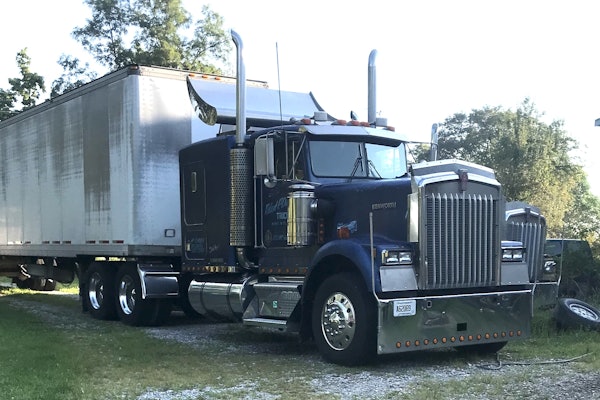Trucking news and briefs for Wednesday, May 17, 2023:
Operators offer insight into driver compensation issues
The Transportation Research Board (TRB) on Tuesday held a public session as part of the Federal Motor Carrier Safety Administration’s ongoing study into truck driver compensation.
As detailed by FMCSA at the Mid-America Trucking Show in March, the TRB, part of the National Academies of Sciences, is heading up the Congressionally-required study into the impacts of various methods of driver compensation on safety and driver retention in the industry. TRB’s goal with the study is to examine the impacts of existing methods of compensation on driver retention and safety performance in the long-haul trucking and intercity bus sectors.
Tuesday’s meeting, which was the fourth TRB meeting as part of the study, featured comments from members of the Owner-Operator Independent Drivers Association and the CDL Drivers Unlimited group (CDLDU).
OOIDA board member Doug Smith advocated for the removal of trucking’s overtime exemption because, in part, trucking “has turned into a 70 hours a week job.” Smith said it’s common to see driver wages advertised at $100,000 a year, but that’s based on 70 hours a week. “It’s just unconscionable in this day and age that we don’t have overtime for truck drivers,” he said.

Smith added that he believes if company drivers are paid overtime beginning after 40 hours, it would also boost earnings for owner-operators.
Bryan Spoon, also a member of OOIDA’s Board of Directors, told the TRB committee that pay affects driver retention because when drivers are compensated well, they tend to stick around at a carrier and/or in the industry.
“A happier driver is a safer driver, and a well-trained driver is a safer driver,” Spoon said. “Compensation is part of that.”
Spoon noted that he’s an owner-operator leased to a carrier and is paid on percentage. He said he believes percentage pay is better than per-mile pay, but noted it also has its drawbacks, including not getting paid directly for deadhead or unladen miles. He noted, however, the carrier he’s leased to does a good job of building those miles into their rates to shippers, so Spoon’s percentage covers those extra miles.
[Related: Driver compensation: Percentage pay dominates for leased owner-operators]
CDLDU founding council members Lee and Lisa Schmitt spoke to the committee about company driver compensation and said their group has found there is no correlation between safety and a method of compensation. Instead, the actual amount of money a driver makes has more impact on safety.
“For a company driver, it’s the stress,” Lisa Schmitt said. “They’re driving down the road day in and day out, thinking of their family back home” and how they can’t pay their bills or feed their family. “It doesn’t matter if I get paid by the mile or by the hour. It’s the amount I get paid.”
The compensation study is set to conclude in July 2024, but could be extended if more research is required. When the study is completed, TRB will issue a formal report to Congress that could include policy or legislative recommendations to various agencies throughout the government to address any issues that are found during the research.
[Related: D.C. demonstrators talk driver pay with FMCSA administrator]
MCSAC covering various safety initiatives in next meeting
The Federal Motor Carrier Safety Administration’s Motor Carrier Safety Advisory Committee will meet next month to discuss ongoing highway safety initiatives.
The meeting will be held virtually on June 6-7 from 9:30 a.m. to 4:30 p.m. Eastern time. Members of the public interested in participating will be able to find the meeting, task statements, a detailed agenda and more at this page closer to the meeting. Requests to register and/or to submit written materials to be reviewed during the meeting must be filed no later than Wednesday, May 31.
The agenda for the meeting will consist of:
- A briefing by the National Highway Traffic Safety Administration and FMCSA concerning the most recent traffic safety data in general, and the commercial motor vehicle crash data.
- A briefing on FMCSA’s Large Truck Crash Causal Factors study plan and objectives.
- A briefing on the National Roadway Safety Strategy, including the 2023 update released in February, followed by a new work for the MCSAC to identify opportunities for FMCSA to collaborate with stakeholders to gain their commitment for additional actions to improve safety.
- A briefing on the DOT’s Strategic Plan and FMCSA’s current strategic plan, followed by new work on FMCSA’s efforts to prepare a new strategic plan for FY 2024-FY 2027.
[Related: NHTSA estimates decrease in highway fatalities in 2022]
FMCSA names new Director of Governmental Affairs
The Federal Motor Carrier Safety Administration on Tuesday announced Brenna Marron as the agency’s new Director of Governmental Affairs.
In this role, Marron will work closely with and advise FMCSA Administrator Robin Hutcheson and senior staff on coordination of the agency’s legislative affairs, Congressional relations, and policy matters affecting federal, state and local government.
Marron brings more than a decade of federal political experience to the position, most recently in the role of Deputy Executive Director of the House Democratic Policy and Communications Committee. During her tenure, she served under the leadership of seven House members and a speaker of the house.
“Brenna is a proven leader and legislative strategist whose knowledge of transportation issues, commitment to safety, and focus on people reflect the values of this agency,” Hutcheson said. “I look forward to collaborating with her to expand and enhance FMCSA legislative initiatives and build upon intergovernmental partnerships at all levels of government. I am confident her skillset will help advance FMCSA’s mission of reducing commercial motor vehicle-involved crashes and improving safety for everyone traveling on our nation’s roadways.”
The appointment marks a return to the Department of Transportation for Marron. She previously served as an advisor within the Federal Railroad Administration and director of scheduling within the office of the Secretary during the Obama Administration. Marron is originally from Salt Lake City, Utah.









